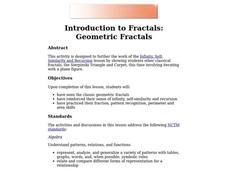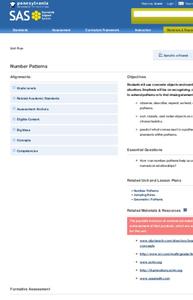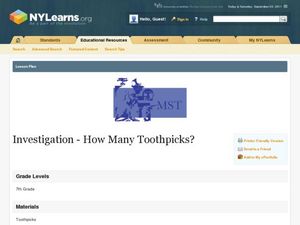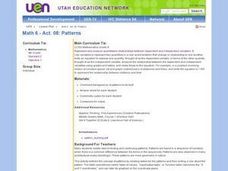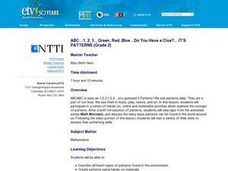Curated OER
Attributes and Patterns with Buttons
Students work with attribute buttons in order to sort, create, and analyze patterns. Students practice identifying patterns and verbalizing the sorting rules and patterns they used. Sample assessments and rubric are provided.
Curated OER
Introduction to Fractals: Geometric Fractals
Students study and observe the patterns made by the areas of the Sierpinski Triangle. Students use the computer to draw two or three iterations to discover the number patterns. Students complete worksheets based on Geometric Fractals.
Curated OER
Geometric Fractals and the Chaos Game
Learners define fractals and patterns. They explore how a seemingly random process can result in a pattern. Students practice probability and fractions skills by playing the chaos game online.
Curated OER
Number Patterns
First graders use manipulatives to complete and extend patterns. In this patterns lesson, 1st graders complete a pattern with a missing element, extend a pattern, and sort objects by characteristics.
Curated OER
How Many Toothpicks?
Students investigate different geometric patterns. In this geometry lesson, students create different shapes using toothpicks. They create different patterns and designs and complete a charts using different measurements.
Curated OER
Making Connections
Seventh graders relate patterns with higher math. In this 7th grade math lesson, 7th graders analyze different methods of portraying data. They relate the data to real life scenarios.
Curated OER
Cannon Balls
Second graders investigate 2 and 3 dimensional objects. They discuss the characteristics of the triangle. Students create sequential patterns and describe the rule for their pattern.
Curated OER
Everyday Heroes You Can Be One, Too
Pupils listen to a read aloud of Alan Baker's, White Rabbit's Color Book while identifying shapes and lines throughout the book. They use shapes and different types of lines to create a bunny of their own. They must use five shapes to...
Curated OER
Patterns In Hexagon Tables
Sixth graders construct a rule about the number of sides found in a pattern of hexagons. In this mathematical problem solving lesson, 6th graders observe different hexagon patterns and create a rule about the relationship between the...
Curated OER
Spiral Patterns in Art
In this art worksheet, students view a picture of Alexander Calder's sculpture "Black, White, and Ten Red." They analyze the sculpture by first finding the "rule" in the Fibonacci sequence. Students read a paragraph about where the...
EngageNY
Recursive Formulas for Sequences
Provide Algebra I learners with a logical approach to making connections between the types of sequences and formulas with a lesson that uses what class members know about explicit formulas to develop an understanding of recursive formulas.
Curated OER
Pizza Topping Combinations
Learners brainstorm pizza toppings and determine the number of possible ways to order a pizza. In this algebra activity, students analyze and investigate geometric patterns as they relate to the concept of a variable. Learners then use a...
Curated OER
Introduction to Arithmetic and Geometric Sequences
Students examine the concept of sequences. Students create a sequence using varied starting numbers, multipliers, and add on values. Students practice determining the starting values to use in order to produce a desired sequence.
Curated OER
Gumdrop Crystal Models
A great way to learn about molecular structures is to make a model. Gumdrops and toothpicks are used to construct crystal models. The models are based on theories of crystal shapes that occur because of positive and or negatively charged...
West Contra Costa Unified School District
Writing Exponential Functions Based on Data
Give your class a concrete example of exponential growth and decay using this hands-on activity. These Algebra II lessons allow for the exploration of exponential growth and decay models, as well as the discovery of the patterns of each....
Curated OER
Exam One Review
In this secondary mathematics activity, students solve problems that involve patterns, arithmetic and geometric sequences, geometric logic and reasoning, and changing bases. The three page activity contains fourteen problems. Answers...
Curated OER
Math 6 - Act. 08: Patterns
Sixth graders use centimeter cubes to build structures and then compare and contrast the patterns they see.
Curated OER
Problem Solving Using Power Polygons
Students investigate geometric shapes by creating figures on a plane. In this polygon lesson plan, students complete a worksheet based on the angles in a power polygon. Students identify the different types of polygons and define their...
Curated OER
Investigation - Looking For Triangles
Seventh graders investigate a series of triangles, looking for patterns and generalizing what they have found. They analyze the pattern data and organize it into a table and graph. Students identify the relationship and discover the rule...
Curated OER
Fabulous Fractals
Students view a video to discover how patterns in nature relate to math. They explore the concept of exponential growth by observing and creating fractals. They solve and design word problems.
Curated OER
ABC...1, 2, 3...Green, Red, Blue...Do You Have a Clue?... IT'S PATTERNS
Second graders view clips from the animated series Math Monsters, and discuss the many ways patterns can be found in the world around us. Following the video portion of the lesson, 2nd graders visit a variety of Web sites to assess their...
Curated OER
Sequences and Exponents
Students practice multiplication sequences and multiplying with exponents. They study how a sequence is a set of numbers which follows a mathematical rule and can be used with all four operations and with combinations of operations.
Curated OER
Transformations Using the Geometer's Sketchpad
Students discover rules for single transformations, rules for composition of transformations, when a figure has transformation symmetry, and if a transformation is congruent to its preimage.
Curated OER
Difference of Squares
Students analyze arithmetic statements. For this difference of squares lesson, students explore patterns and factor the difference of two squares. They compare quantities with integers. Students model and solve equations.



